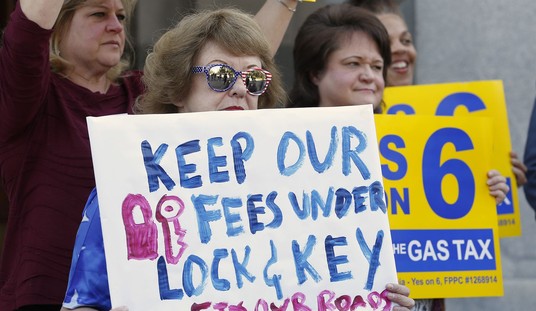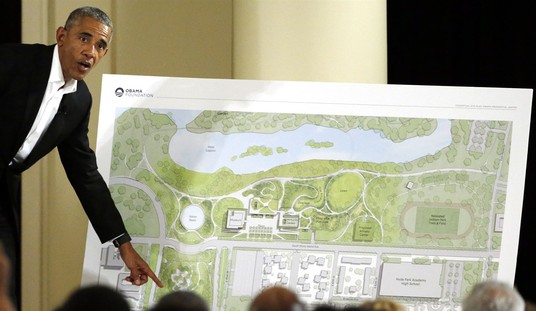Introduction
The head of the U.S. Army investigation into Pvt. Scott Thomas Beauchamp is breaking his silence in an exclusive interview with Pajamas Media.
Stationed in Iraq, Beauchamp is an Army private who wrote three articles for The New Republic magazine — which quickly came under suspicion when active-duty military bloggers, journalists, and bloggers, like Confederate Yankee and Blackfive, found his claims to be impossible, excessive or unlikely.
Most controversial of Beauchamp’s stories was the third – “Shock Troops.” It included allegations of the author and another soldier verbally mocking a burn victim, claims of a “Saddam era dumping ground” containing children’s remains being desecrated by American soldiers and tales of another soldier using a Bradley armored vehicle to smash civilian stalls and run over dogs for sport.
Beauchamp seems to have slipped past the normal fact-checking process because his new wife, Elspeth Reeve, is a fact checker for the magazine, as we revealed here last month.
As the blogosphere probed the claims made by Beauchamp in the New Republic, the U.S. Army launched its own investigation.
The Army was forced to act. If Beauchamp’s claims were true, they would indicate a serious breach of military discipline.
Major John Cross – Executive Officer, 1-18 Infantry (Vanguards), Second (Dagger) Brigade Combat Team, First Infantry Division – was the lead investigating officer. After days of careful scrutiny and interviews with all involved personnel, he found all charges made by Beauchamp in The New Republic to be false.
Beauchamp himself signed a sworn statement not standing by the accounts in his three pseudonymous articles for The New Republic. Citing federal privacy concerns the Army has refused to release the statement.
While Scott Thomas Beauchamp has repeatedly turned down interview requests–including one as recently as last week– Pajamas Media’s Bob Owens, who runs the PJM network blog Confederate Yankee , was enterprising enough to arrange an email interview with Major Cross.
In a wide-ranging interview, Maj. Cross provides surprising new evidence about Beauchamp and the editorial process at the New Republic.
Interview
Owens: Major Cross, for our non-military readers, what is a Battalion Executive Officer, and how does your position relate organizationally to those on the squad level?
Cross: As the Executive Officer of the Vanguards, I’m the second in command of the Battalion, an organization of 700 Soldiers in five different companies. I’m responsible for the resourcing, maintaining, and control of the formation. I supervise the Battalion Staff to ensure that each section supports the commanders and Soldiers in the field, so they can execute their missions. I’m responsible for the planning, resourcing, and maintenance management of 30 M2A2 (ODS) Bradley Fighting Vehicles and 14 M1A2 Main Battle Tanks that are in the Battalion. I’m also responsible for the planning, synchronizing, targeting, and integration of both kinetic and non-kinetic means to deliver positive effects across the Battalion area of operations. What all of this means to the Soldier in the rifle squad is that the buck stops with me for food, fuel, ammunition, maintenance, and other administrative actions.
Owens: What was your role in the formal investigation into the article “Shock Troops,” published in The New Republic under the pseudonym “Scott Thomas?”
Cross: I was the investigating officer (IO) for the investigation that looked into the veracity of the allegations made by “Scott Thomas” in his article “Shock Troops.”
Owens: In this role, is it fair to say that you “know all there is to know” about the Army’s formal investigation?
Cross: As the IO, I can speak to the evidence collected during the investigation from the Soldiers that had served in the areas described by the author of “Shock Troops.”
Owens: That established, let’s backtrack a bit. When and why was it decided that a formal investigation was warranted into the claims made by “Scott Thomas,” in the New Republic, and what was your initial reaction upon reading “Shock Troops” for the very first time?
Cross: On 24 July 2007, COL Gibbs, the Commander of 4th Brigade, 1st Infantry Division, (the Brigade that the Vanguards are attached to here in Southern Baghdad) directed the investigation to look into the allegations made by “Scott Thomas.” My biggest concern was the alleged “Saddam Era dumping ground” described in the “Shock Troops” piece and that the other events portrayed did not accurately reflect professionalism and dedication of our Soldiers.
Owens: When was it discovered that “Scott Thomas” was a pseudonym used by Private Scott Thomas Beauchamp? Was that something you learned prior to Beauchamp “outing himself” in the New Republic on July 26, or was the New Republic article the first time the author’s identity was known?
Cross: Given several details revealed in “Shock Troops,” we determined that the story likely originated in a specific platoon, which is where we began the investigation. We questioned the members of that platoon about the alleged events in the story and began collecting sworn statements from each Soldier in the unit. On 26 July 2007, at 1540 hours in Iraq, PVT Beauchamp made his initial statement concerning the allegations made in “Shock Troops.” At this time, I did not know PVT Beauchamp was the author of the article. Later that day, at 1700 hours, PVT Beauchamp, in his second sworn statement, admitted to writing three articles for The New Republic (TNR) under the pseudonym “Scott Thomas.” Later that same day, 26 July 2007, TNR posted, “A Statement from Scott Thomas Beauchamp,” on their website. In this posting, PVT Beauchamp identified himself as “Scott Thomas” the author of “Shock Troops.”
Owens: In that same July 26 article in the New Republic, the magazine’s editor claimed that “the article was rigorously edited and fact-checked before it was published.” Based upon what you know of the article, and having led the formal military investigation that came about as a direct result of the claims made in “Shock Troops,” do you find this to be a credible claim?
Cross: I have not had any personal contact with the editors of TNR, nor am I aware of them conducting any sort of fact checking prior to the publication of “Shock Troops.”
Owens: On August 2, The New Republic’s editors claimed, “All of Beauchamp’s essays were fact-checked before publication. We checked the plausibility of details with experts, contacted a corroborating witness, and pressed the author for further details.” In the same article, during the course of their “re-reporting” of the incident, the editors claimed “Most important, we spoke with five other members of Beauchamp’s company, and all corroborated Beauchamp’s anecdotes, which they witnessed or, in the case of one solider, heard about contemporaneously.”
Have you, during the course of your investigation, uncovered any soldiers in Beauchamp’s company that could be regarded as a corroborating witness, or that corroborated the anecdotes, or even heard the stories contemporaneously? If so, what was the context of their corroboration? If not, why do you suppose that The New Republic tells a story so radically different than that the soldiers related during the course of the formal investigation?
Cross: In the course of my investigation, I did not interview anyone who corroborated PVT Beauchamp’s claims in “Shock Troops” that a Soldier was observed wearing skull parts recovered from a “Saddam-era dumping ground” on his head, dogs were being deliberately hit by Bradley Fighting Vehicles, and that a disfigured woman was openly mocked by Soldiers in the FOB Falcon dining facility.
Owens: What has been the reaction among the members of Beauchamp’s company to the claims he made in “Shock Troops?”
Cross: Many Soldiers were upset about how the Soldiers in the article were portrayed as callous and uncaring. These characteristics do not reflect the professionalism and integrity of the Vanguard battalion and the high standards of conduct demanded by the Dagger Brigade’s leadership.
Owens: Do you think it is likely that some soldiers may have told The New Republic one story, and then provided a different story to investigating officers?
Cross: I can’t speculate about anything involving The New Republic, but I can speak to our procedures. When conducting the investigation, I focused on the information and evidence collected from the Soldiers in PVT Beauchamp’s unit in the form of written and signed affidavits, which did not support the events portrayed in the story. As all of the Soldiers interviewed during the course of the investigation made sworn statements, they understand the consequences of making false official statements.
Owens: Various sources have related that Scott Thomas Beauchamp was a PFC prior to his unit’s deployment the Middle East, a PV-2 at the start of this investigation, and is presently holding the rank of PV-1. Is this accurate?
Cross: Yes, he currently holds the rank of PV-1.
Owens: Private Beauchamp was the subject of a second investigation not directly related to the “Shock Troops” article. Has this second investigation been concluded? If so, have any further actions been taken against Beauchamp as a result?
Cross: During the initial investigation that I conducted, I found that there was quite a bit of information posted by PVT Beauchamp on his personal blog site that was of a sensitive nature. Specifically, in March 2006, PVT Beauchamp posted the dates of the unit’s deployment to Iraq. I recommended that a second investigation be conducted to look into possible violations of Operational Security by PVT Beauchamp either on his Blog or in his articles posted by TNR. The outcome of this investigation was that PVT Beauchamp did violate operational security by posting the dates of the unit deployment on his blog, but the Army Regulation governing operational security, at that time, was not punitive in nature.
The Battalion Commander, having spoken with PVT Beauchamp on a couple of different occasions, determined that, while he could discharge PVT Beauchamp from the Army for his actions in the past, it would be better for PVT Beauchamp if he had another opportunity to complete his tour of service in an honorable fashion. He was counseled by the commander about his actions, but given the chance to conduct his duties as an infantryman with the Vanguard team.
Owens: What other issues surrounding “Shock Troops” and the investigation into the claims made by Scott Beauchamp and the editorial staff of The New Republic should Pajamas Media/Confederate Yankee readers be made aware of?
Cross: The Soldiers of the unit he describes, the Vanguards, have served the United States with pride and have brought more security to a very violent area of Baghdad in the last twelve months. While the publicity of these unproven allegations has been a distraction, it has also caused us to refocus our Soldiers on what has made our Battalion great. We continue to conduct ourselves as American Ambassadors and treat the people of Iraq with dignity and respect. PVT Beauchamp volunteered to serve his country at a time of war. He has served at the tip of the spear in the Global War on Terror and is continuing to do so. While his article has brought much attention to him and our unit, we are committed to serving our country and the people of Iraq until our mission here is complete.
Conclusion
And there you have it.
– Private Scott Beauchamp did not reveal that he was “Scott Thomas,” author of “Shock Troops,” until he was asked to sign a second sworn statement. It was after he signed this statement that his identity was revealed in The New Republic.
– Major Cross has seen no evidence of any sort of fact checking by The New Republic’s editors prior to publication, a sentiment shared by Army Public Affairs Officers in both Iraq and Kuwait. It is also worth noting that TNR editors have refused to publish PAO statements that contradict their claims.
– Major Cross was unable to find anyone in Beauchamp’s squad, platoon, or company that would corroborate the stories he told in “Shock Troops.”
– Beauchamp was the subject of a second investigation, which found him guilty of violating his unit’s operational security for which he could have been thrown out of the Army.
The U.S. Army and the soldiers in Beauchamp’s unit seem to have been very forgiving of his fraudulent stories and potentially dangerous operational security violations.
This is the third time in recent memory that a New Republic writer has been persuasively charged with fabrication. Stephen Glass, who was found to have made up 27 of the 41 articles he wrote for the magazine, is perhaps the most famous case. Glass’ exploits were chronicled in the movie “Shattered Glass.” The Glass incident severely damaged the credibility of the magazine, and should have led to far more stringent editorial standards…it obviously did not.
It is doubtful that editor Franklin Foer and The New Republic deserve yet another chance, and that readers will be as loyal to the magazine as the military has been to Beauchamp.
Bob Owens covers American politics, media bias, and foreign military affairs from Raleigh, North Carolina in his personal blog, Confederate Yankee.
Correction: The article originally said Beauchamp had signed a sworn statement that recanted the accounts in his three pseudonymous articles for The New Republic. He did not recant, but did not stand by his claims.









Join the conversation as a VIP Member